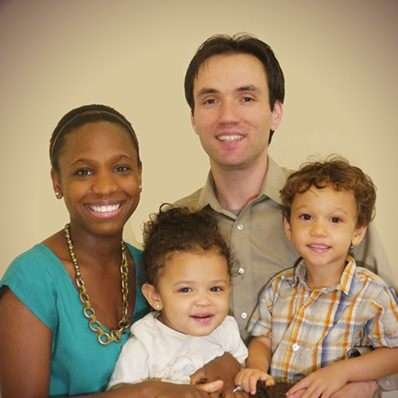Libertarians Offer Palatable Alternatives in Virginia and New Jersey Elections
Options for those with a taste for freedom and tolerance.
Less than a minute into the interview, Ken Kaplan says something no politician should ever admit.
"I know I'm not going to win," said Kaplan, the Libertarian Party candidate for governor in New Jersey.
Like other third parties, Libertarians have never won much of anything in American politics. But as they have since the party was founded in the 1970s, their candidates keep pressing on with a message of limited government, lower taxation and limited regulation.
The Libertarian candidates in Tuesday's gubernatorial elections in New Jersey and Virginia represent the two sides of third-party politics in America. On one hand, they are principled, committed and willing to forge ahead despite virtually no chance of success — issue candidates who will be happy to win a few supporters to their cause in the hope of greater victories to come.
On the other hand, in a nation growing more dissatisfied with the two traditional political parties, with Democratic promises that never seem to be delivered and Republican ideals that seem rooted in the 20th century, they represent a new way forward.
Kaplan and Robert Sarvis, the Libertarian candidate in Virginia's gubernatorial race, are not going to win on Tuesday. Both say they are running because the two major parties are a false choice for voters.

"Virginia really needs another option," Sarvis told Watchdog.org in an interview this spring, before he officially was a candidate on the ballot. "I think the other two candidates really epitomize exactly what's wrong with their respective parties, and really shouldn't be trusted with the reins of government."
It's in this kind of race — and this kind of political climate — that Sarvis has garnered up to 13 percentage points in the public-opinion polls. And that's nothing to sneeze at for a third-party candidate who has never held public office and has raised barely $200,000 mostly from individual Virginians' donations — roughly one-one hundredth of what his opponents have raised from major outside players.
The two gubernatorial elections this week are outliers on the American political calendar, but they can be important harbingers — for both good and ill — in advance of next year's critical mid-term elections, when voters will choose governors in more than 30 states, along with congressional members and state legislators.
In Virginia, polls have shown repeatedly that voters aren't satisfied with their major party choices — ultra-conservative Republican candidate, Ken Cuccinelli, and wheeling-and-dealing Democrat, Terry McAuliffe.
And that dissatisfaction with them and both political parties is exactly why Sarvis said he decided to make a run for it.
"I basically looked at what the race was going to be like, and when it became clear that it was going to be Terry McAuliffe against Ken Cuccinelli, I decided, why not run," Sarvis said.
The story in New Jersey is different, but with similar themes.
Unlike Virginia, the race in New Jersey is a foregone conclusion, with incumbent Gov. Chris Christie on his way to any easy victory over state Sen. Barbara Buono, D-Middlesex, the Democratic nominee.
Though polls show voters to be dissatisfied with many of Christie's policies, the governor is widely popular, thanks in no small part to his outgoing personality and leadership skills in the wake of last year's Hurricane Sandy that struck the New Jersey coastline.

Kaplan's ability to make an impact in the race is minimal. He was not allowed to participate in any of the debates because he was not included in any of the statewide polls conducted during the campaign, and he has not had a single television ad because he's shoestring campaign is running on a budget of less than $5,000 in an election when special interests on both sides have dumped millions into the coffers of the two major candidates.
But Kaplan says this is still a high water mark for Libertarians in New Jersey. When he ran for governor in 2009, he got less than one-half of 1 percent of the vote.
"It's going to be a Christie landslide, so if you want to protest Christie but you don't like the Democratic candidate, you can vote for me," he said Friday during an interview with Watchdog.org.
Growing up, Kaplan says his parents were liberal Democrats, but they were an entrepreneurial bunch who owned a men's clothing store in West Orange. That combination of social liberalism and business-friendly economics is what is missing in the political discussion today, he said.
While much of Sarvis' success is a rejection of the two major party candidates, something else seems to be happening, too — a philosophical shift towards a more socially liberal, while still fiscally conservative, Virginia. A place that's tolerant — but not when it comes to government over regulation or overspending.
Sarvis' campaign line boils it down: "Virginia — open-minded and open for business."
And with Virginia acting as a barometer for elections nationally, all eyes are on the race to see how well that philosophy does at the ballot box.
"To a certain degree I do think that the voter population as a whole is, if you look at polling, just even nationally, is economically a little more conservative, but socially a little liberal," said Geoff Skelley, political scientist with the University of Virginia's Center for Politics. "That seems to be kind of the way things are going.
"From that perspective, I would think that kind of platform going forward could be a winning one with the right candidate," Skelley said.
That's what Sarvis hopes, too. Reaching the 10-percent threshold on Tuesday would pave the way for future candidates to get on the ballot and into the race.
Sarvis, who ran as a Republican for a Virginia State Senate seat in 2011 and lost, has come under fire recently for supposedly lacking pure Libertarian credentials. Although opposed to Medicaid expansion, he says things like he couldn't support expansion "absent" an overhaul of the system. And on taxes, he's suggested a miles-driven tax is one example of a transportation tax that would be more efficient than increasing the sales tax, which is what Virginia did this year.
"Nobody knows what can happen with whether we're going to find the candidates to run," Sarvis said last week in an interview with Watchdog.org. "But I certainly hope to help us search for candidates who can put forward a good message."
Just being on the New Jersey ballot is a victory for Kaplan. He said he knows that his policy plans — he wants to get rid of the state income tax by reducing state spending until it is no longer necessary, change state policy for housing density requirements and implement a tuition-based model for public education — would require more than just a Libertarian in the governor's mansion.
Asked if the Libertarians could be the third party that exploits the nation's dissatisfaction with the two major parties, Kaplan is both hopeful and reserved.
"I'm not sure that Libertarians will ever come to power, because we are principled and we are ideological," he said. "And that's not how people vote in this country. People vote for what they think the politicians will be able to do for them."
Kaplan was right — he won't win. Still, he and Sarvis say they run with the hopes that one day, Americans will value free markets, and a free society, more than things politicians can give them.
This article originally appeared on Watchdog.org.


Show Comments (110)